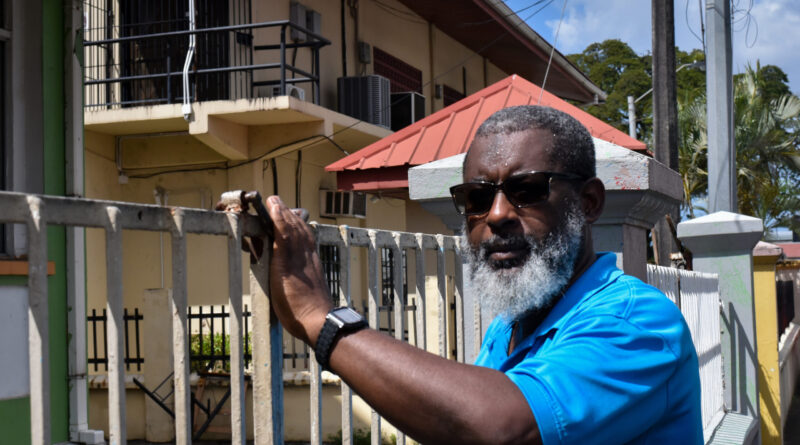Trump’s cuts to anti-crime programs in the Caribbean could cost lives
By ROBERT STEWART
Tunapuna, Trinidad – An old, two-story post office in Tunapuna on the island of Trinidad is guarded by a locked gate and a dog named Jamette.
To get there, Mtima Solwazi pulls off the main road and teeters along a path through the town’s sprawling cemetery.
“Right now, we’re passing through death,” he says. “Where we’re going to, the program we’re doing would be for life. Our program is supposed to bring life to the young people who are trapped in this cycle of violence and cycle of hopelessness.”
Solwazi’s programs work with some of the most at-risk youth in some of the most violence- and gang-prone areas east of the country’s capital.
But just like similar programs across the region, Solwazi received a stop work order from Washington so that the new administration could reevaluate and realign U.S. foreign aid. In this town, that means young men who had qualified to participate will remain in their neighborhoods, exposed to crime and drugs.
That’s something the USAID agencies had meant to combat. Crime in neighboring countries sometimes makes its way to American shores, which is why the U.S. has partnered with Caribbean nations on anti-crime initiatives since at least 2010.
Solwazi said he complied with the stop-work order “with a heavy heart.” He said he appreciates the support he’s received from the U.S. Embassy and respects Donald Trump’s desire to get funding in order. Still, he takes the development personally.
“Our young men are killing each other on the streets of Port of Spain,” he said.
Randy Seepersad, a criminologist with the University of the West Indies in Trinidad and Tobago, says the consequences of the funding freeze and potential cuts will be dire.
“I’ll tell you one of the tangible effects in terms of or some of the projects – the cost could be in human lives,” he said. When programs that focus on preventing violence in at-risk communities abruptly end, Seepersad says, people die.
Seepersad led USAID-funded research on criminal dynamics across 11 countries in the Caribbean, publishing the work in 2024. He says U.S. funding has positively contributed to crime prevention efforts across the region, often in ways people don’t realize.
He said programs funded by the U.S. expose researchers, government officials and practitioners to sweeping benefits. Those include access to America’s world-class technology, expertise and training in monitoring and evaluating programs and accountability best practices. USAID also had a repository of top-of-the-line documentation on crime prevention, according to Seepersad. That has now gone off-line.
When American resources disappear, Seepersad said, U.S. partners working on the ground to tackle crime sometimes fall back into doing what they know. He said crime statistics show that those traditional methods don’t work. He worries a setback in this arena across the Caribbean could have far-reaching consequences – and even impact the United States.
For Solwazi, the work is very personal. He says programs like the ones he runs helped him get off the streets decades ago.
Back in 1990, Solwazi says, he ended up in jail for a brief stint. Growing up in one of the country’s rougher neighborhoods on the capital’s outskirts, Solwazi had gotten involved in selling drugs and violent altercations. He says he’d been trying to cultivate a tough persona – a defense mechanism against bullying. At age 17, Solwazi said, he was briefly placed in an adult facility that frightened him.
“I was released, and I never looked back,” said Solwazi.
But to get off the streets for good, he also needed guidance. Solwazi said he found that at an institution called SERVOL in 1992. There, he says, organization founder Father Gerard Pantin forced him to confront his life decisions.
The experience, he said, got him out of the “web” of drugs and gangs, and he began working at SERVOL in 2001.
Capital News Service spoke with people who say Solwazi has worked extensively for years mentoring young people in the country’s rougher neighborhoods and within the prisons.
While earning a Master’s in Sociology, Solwazi also did training through the International Visitors Leadership Program – funded by the U.S. government. It took him to the U.S., where he learned about conflict resolution and countering violent extremism. The U.S. programs showed him how to prevent at-risk youth from taking a wrong turn, he says.
“I didn’t realize you could do so much,” said Solwazi.
Today, he runs the Oral Tradition ROOTS Foundation, a non-profit that aims to help at-risk youth from rough neighborhoods find a path away from drugs, gangs, and violence prevalent in their communities.
He uses poetry – written and spoken-word – to help young people deal with trauma. It helps them understand themselves and function in their communities, he says. Traditional music, public speaking, access to the libraries, photography, videography and international poetry slams are among the many items on the Roots Foundation’s menu of ways it engages the young men and women that participate in the program.
That’s what the U.S. was about to invest in, according to Solwazi and people who know him. One program, funded by the U.S. Embassy’s Bureau of International Narcotics and Law Enforcement, would have helped youth develop life skills, strengthen a sense of community,y and reduce gang recruitment, according to Solwazi.
The second program, called “Make it to Thirty,” would have targeted young men ages 16-30, a group that often falls victim to and commits violence, said Solwazi. Make it to Thirty was funded by USAID.
Both programs would have included a partnership with local police and mentoring.
Local leaders had high hopes. Because of his work in vulnerable communities, Solwazi can make things happen that others can’t, said Beverly Williams, deputy executive director for NALIS, the organization that manages a vast network of the country’s libraries. Williams recalls trying to set up a library in an at-risk community, Beetham Estate Gardens.
“I called Mtima. Immediately he called someone in the community, and we did a site visit,” said Williams. “Six months later we opened a very successful library in that community.”
“When the reading stops,” said Williams, “the violence begins.”
Sheldon Villafana said he was so impressed that he sent his son to Solwazi’s foundation to learn from him.
“To actually get young men who have had struggles and hard beginnings and rough times in life to actually start to write, to actually start to think, to actually start to rehearse and practice,” said Villafana, “that’s something really positive.”
Candace Bond, the former U.S. Ambassador under President Biden, personally thanked Solwazi for partnering with the Embassy and lauded his foundation for projects that help prevent and help youth find alternatives to crime. Bond described crime prevention as a goal the program shares with the U.S.
Now the pause in funding is being worked out in the courts. Several organizations have sued the Trump administration over January’s funding freeze, including some based in Maryland.
One aid organization had been running programs to steer at-risk youth away from crime and violence in St. Lucia, Grenada, and Guyana. One of Solwazi’s programs was going to be part of their effort in Trinidad and Tobago.
While that fight plays out, Solwazi is hoping for the best. Giving a tour on a recent day, he opened the gate to the school site with a clank, praising Jamette with a simple “good,” then stepped inside. He pointed up through the missing 2nd level floorboards, and spoke of things he believes will eventually come to pass.
“On this side here,” he says, “we’ll have a little cafeteria. This here will be the office and reception . . .”
Solwazi said that had he not received the stop-work order he would be working with the hotspot communities impacted by Trinidad and Tobago’s current state of emergency.
“All respect to Mr. Trump. I understand what he’s doing,” Solwazi said. “But I just want him to know this affected a lot of young people, and we do not know what could have been. We don’t know what could have been.”

Capital News Service is a student-powered news organization run by the University of Maryland Philip Merrill College of Journalism. With bureaus in Annapolis and Washington run by professional journalists with decades of experience, they deliver news in multiple formats via partner news organizations and a destination Website.

